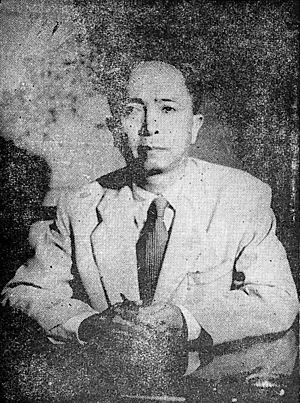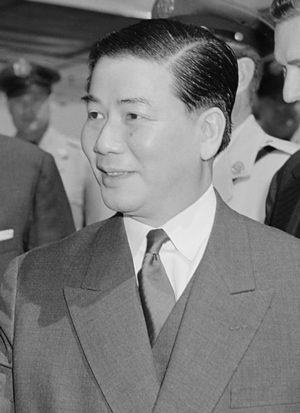Nguyễn Ngọc Thơ facts for kids
Quick facts for kids
Nguyễn Ngọc Thơ
|
|
|---|---|

Official portrait, 1956
|
|
| 1st Prime Minister of the Republic of Vietnam | |
| In office 4 November 1963 – 30 January 1964 |
|
| Head of State | Dương Văn Minh |
| Preceded by | Position established |
| Succeeded by | Nguyễn Khánh |
| 1st Vice President of the Republic of Vietnam | |
| In office 18 December 1956 – 2 November 1963 |
|
| President | Ngô Đình Diệm |
| Preceded by | Position established |
| Succeeded by | Nguyễn Cao Kỳ (1967) |
| Personal details | |
| Born | 26 May 1908 Long Xuyên, Annam, French Indochina |
| Died | 12 June 1976 (aged 68) Saigon – Gia Dinh, Republic of South Vietnam |
| Political party | Independent |
Nguyễn Ngọc Thơ (born May 26, 1908 – died June 12, 1976) was an important politician in South Vietnam. He was the first Vice President of South Vietnam, working with President Ngô Đình Diệm from 1956 until 1963. Diệm was removed from power and killed in a coup that year.
Thơ also became the first Prime Minister of South Vietnam. He served from November 1963 to January 1964. He was chosen by the military leaders, led by General Dương Văn Minh, who took over after Diệm. Thơ's time as Prime Minister was a bit confusing. The military leaders and the civilian government often disagreed. Thơ left politics when General Nguyễn Khánh took power in another coup in January 1964.
Contents
Early Life and Career
Nguyễn Ngọc Thơ was born in Long Xuyên province, in the Mekong Delta region of southern Vietnam. His family was wealthy and owned a lot of land. In 1930, he started working for the French rulers of Vietnam. He became a provincial chief, which is like a local governor.
During World War II, Japan took control of Vietnam from the French. Thơ became a high-ranking secretary in central Vietnam. He knew Ngô Đình Diệm, who later became president. The French thought Diệm was working with Japan and tried to arrest him. Thơ warned Diệm, helping him escape.
In March 1945, Japan fully took over French Indochina. Thơ was put in a crowded prison cell. One of his cellmates was Dương Văn Minh, who was a young military officer at the time. They became good friends. Thơ was released first and helped Minh get out of prison too.
After World War II, Thơ became the Interior Minister in the French-supported government of Vietnam. After France left Vietnam, the country was divided into North and South Vietnam. In 1955, Ngô Đình Diệm became president of South Vietnam. Thơ was then sent to Japan as the first ambassador. Even though he was injured, he helped Vietnam get money from Japan for the war.
Dealing with the Hòa Hảo
In 1956, President Diệm asked Thơ to return to Vietnam. He needed help dealing with the Hòa Hảo, a religious group that had its own private army. The Hòa Hảo controlled parts of the Mekong Delta and did not want to follow the government.
General Dương Văn Minh led the military fight against the Hòa Hảo. Thơ helped by trying to convince their leaders to join the government peacefully. He offered them money and positions.
However, one Hòa Hảo leader named Ba Cụt refused to stop fighting. Ba Cụt's family had lost land to Thơ's father many years before, so he disliked Thơ. Thơ tried to meet with Ba Cụt to make peace, but they could not agree. Ba Cụt was captured in April 1956 and executed. His forces were then defeated.
This success made Thơ more popular. In December 1956, Diệm chose Thơ to be his Vice President. Diệm hoped that having Thơ, who was from southern Vietnam, would make his government more popular with people there. Diệm's family was mostly from central Vietnam.
Working with President Diệm
Even though Thơ was Vice President, he did not have much real power. President Diệm's younger brothers, Nhu and Cẩn, held most of the power. They had their own private armies and secret police. Thơ was not allowed to make big decisions.
Thơ was in charge of South Vietnam's land reform program. This program was supposed to give land to poor farmers. However, Thơ himself was a large landowner. Some people said he did not try hard enough to make the program work.
Thơ also helped with economic policies. He managed an American aid program that brought goods into Vietnam. But most of these goods were for rich people, not for developing the country. The gap between the rich and poor grew during this time. American advisors thought Thơ and Diệm's brothers did not listen to their advice.
In 1961, Diệm removed Thơ from his economic duties. Thơ then tried to get American officials to pressure Diệm to change his policies. He told them that Diệm was too strict and favored Catholics over Buddhists.
Role in the Buddhist Crisis
Thơ was a Buddhist, but he often praised Diệm's Catholic government. When the Buddhist crisis began in 1963, Diệm appointed Thơ to a committee. This committee was supposed to deal with problems raised by the Buddhist community.
The crisis started when government forces killed eight Buddhists during a protest. The committee led by Thơ claimed that the Viet Cong were responsible for the deaths. This made Buddhist protests even worse. When a Buddhist monk burned himself to death in protest, Diệm's sister-in-law, Madame Nhu, made fun of it. Thơ refused to criticize her comments.
Thơ was part of a group that tried to make a deal with the Buddhists. An agreement was signed, but it was never put into action. Thơ was later criticized for this. He also said that Buddhism was not a real religion and that Buddhist monks did not need much training.
As the crisis grew, many government ministers wanted to resign. But Thơ convinced them to stay. He himself thought about resigning but the generals planning a coup asked him to remain. They did not want people to suspect a coup was being planned.
Becoming Prime Minister
Thơ was unhappy with Diệm's rule and told American officials about his concerns. He believed the country was going in the wrong direction. He also thought that many of the fortified villages built by Diệm's brother were not working.
After the 1963 South Vietnamese coup on November 1, 1963, Diệm and his brother were killed. Five days later, on November 6, Thơ was appointed Prime Minister by General Minh's military government. He was the main civilian leader in the new government. Thơ also became the minister for finance and the economy.
Working with the Military
Thơ's government faced many problems. Generals Trần Văn Đôn and Tôn Thất Đính were in both the civilian government and the military council. This caused confusion. If Thơ gave an order they disagreed with, they would go to the military council and cancel it.
Newspapers, which were now free from censorship, reported that the military government was not working well. They said that all twelve generals had equal power and could stop decisions. The press also criticized Thơ, saying he was a "tool" of the military. They questioned his past actions under Diệm.
Thơ became very angry with the newspapers. He called about 100 journalists to his office and yelled at them. He said they were lying and accused one journalist of being a communist. He then closed down three newspapers.
In January 1964, a group of sixty important citizens was formed to advise the government. Thơ hoped they would help create a new constitution. But this group mostly debated and did not achieve much. Thơ later admitted it was not very successful.
Government Policies
After Diệm's fall, the United States lifted its economic restrictions on South Vietnam. The U.S. quickly recognized Thơ's government.
Thơ's government stopped Diệm's "Strategic Hamlet Program." This program had moved many farmers into fortified villages to separate them from the Viet Cong. Thơ said that only 20% of these villages were actually under government control. His government dismantled many of them and let people return home.
Thơ's government also removed many officials who had supported Diệm. Some people thought he was not strict enough, while others thought he was too harsh. Many officials were arrested without charges and later released.
Thơ and the military leaders had a secret plan to end the war. They believed that many members of the Viet Cong were not communists. They thought these people were just unhappy with the government and could be convinced to join the non-communist side. Thơ believed they could weaken the communists by winning over these groups.
The government did not want to bomb North Vietnam. They felt it would make them look bad. Instead, they wanted to use a more peaceful approach to win over people. However, they were removed from power before they could fully try their plan.
End of His Time in Power
Thơ's government did not last long. The number of Viet Cong attacks increased after Diệm was removed. It became clear that the military situation was much worse than Diệm's government had reported.
Thơ also became unpopular with some military leaders. On January 29, 1964, General Nguyễn Khánh took power in a bloodless coup. Khánh claimed that Minh's government was planning to make a deal with the communists. However, Khánh later admitted these claims were false. Both Khánh and Thơ agreed that the United States strongly supported this coup.
Thơ was arrested during the coup and placed under house arrest. He was then removed from politics. He left government and retired. His activities after leaving politics are not well known. He died in 1976 in Saigon.
Images for kids
 | Sharif Bey |
 | Hale Woodruff |
 | Richmond Barthé |
 | Purvis Young |




